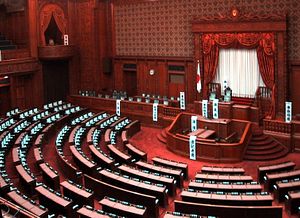In the final days of the ordinary Diet session, the Liberal Democratic Party (LDP)-initiated Public Offices Election bill came into fruition, adding six new seats to the House of Councilors, the upper house in Japan’s legislature. The move was widely criticized as aiming to rescue incumbent candidates from merged electoral districts. After six hours of deliberation in the lower house, the bill faced outrage from all opposition parties but was passed by the majority LDP and Komeito parties. The reform added two seats to the largest growing constituency, Saitama prefecture bordering Tokyo, and bumped up proportionate representation by four seats.
As the population shifts toward concentrated cities, Japan’s demographic changes are drawing more and more attention to the over-representation of certain prefectures and the voter inequality between urban and rural constituencies. In response to this, in 2015 western Tottori and Shimane prefectures were merged into one electoral district, as were Tokushima and Kochi prefectures. This means in next years’ summer upper house election, these four prefectures will elect only two representatives instead of four.
The LDP’s official argument is that giving two new slots to the Saitama electoral district will shrink the largest vote disparity between the least and most populous constituencies from 3.08 to 2.985 — making the weight of one vote marginally more equal. The Supreme Court ruled a 3-to-1 voter disparity was not unconstitutional in 2016 but critics fear the issue may lose steam if the public is under the impression that voter disparity can’t be fixed or doesn’t need reform.
Opposition parties threw shade at the ruling LDP’s efforts to make room for more senators on the back of a dwindling population and a growing public consensus on downsizing the number of lawmakers and public expenditure on salaries.
Yu Uchiyama, a political science professor at the University of Tokyo agrees that the latest changes are “ad hoc” and serve the party’s self interest. He says the biggest giveaway is the lack of principle, which exposes a ploy to save candidates in merged prefectures from losing their jobs — a practice he worries will bring more harm than good to Japanese politics.
Japan’s upper house electoral system is a complex combination of both proportional representation and single seat electoral districts. The problem with proportional representation is the introduction of a “closed list,” a party-supplied order of candidates who are prioritized over other candidates irrespective of the votes they collected. Uchiyama says it doesn’t make sense to mix a closed list system into the current open-list system as it evidently puts private interests over the public interest.
The latest reforms fall short of fundamental reforms that was promised “without fail” by the LDP in the previous 2016 upper house election. Uchiyama says one explanation is that increases in the weight of votes in rural areas tend to be beneficial to the LDP, which has a strong presence in rural areas.
At a press conference on Wednesday, the Japan Innovation Party announced an upper house cost-cutting plan to assure the public that the newest members to the upper house would not strain taxpayer pockets. The party secretary general said that while people may not understand the reason behind adding six new seats, they do propose that lawmakers from all political parties be restricted on overseas observation trips.
The LDP and Komeito coalition has set up a working team to plan measures to cut the annual expenditure of national diet members alongside upper house cost-saving. Komeito’s secretary general said they will review the expenses of all parliamentarians and will push “painful” reforms to be incorporated by next year’s fiscal budget.

































